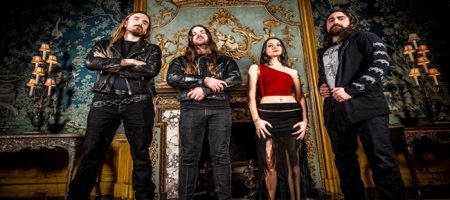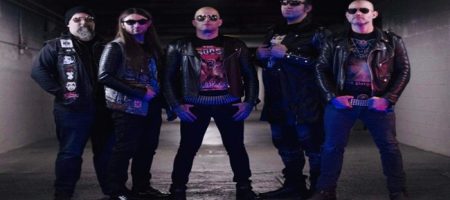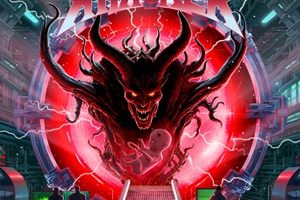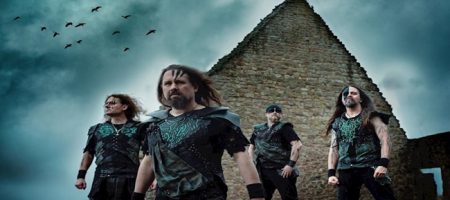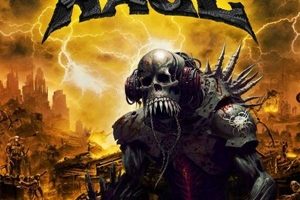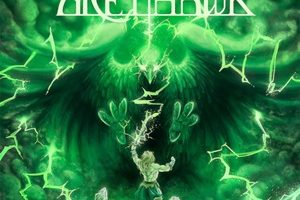Sonata Arctica – Into the Cold Beyond
Sunday, 25th February 2024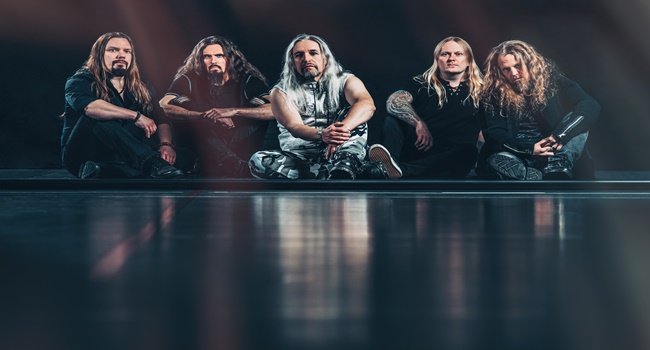
Photo: Jaakko Manninen
Bonafide headliners when it comes to power metal, Sonata Arctica feels the time is right to pivot back into more conventional waters through their latest album Clear Cold Beyond. Which means those who love the higher energy, faster offerings from the past will have plenty to enjoy through this record – while the mid-tempo outings still possess that melodic, careful touch that speaks to quality songwriting and performances from these musicians. We reached out to vocalist Tony Kakko once again to fill us in on the unique differences that influenced that return to power metal, discussion on the acoustic albums and subsequent tour, insight into a specific period that maybe the band veered off track in their career, physical training rituals to prepare for touring, plus future plans.
Dead Rhetoric: Clear Cold Beyond is the 11th and latest studio album for Sonata Arctica. Tell us how the songwriting and recording process went this time around – do you believe the additional down time due to the pandemic allowed the band to dig deeper and refine certain details more than ever before?
Tony Kakko: The songwriting thing, once I got started, it was super easy and at some point when we got into the studio and started recording the drums, I had to tell the guys… we had a meeting, should I keep writing, or should I stop as I have enough songs here, and keep those ideas for later on with the next album? We decided these sixteen songs were good enough here, we would choose from there which ones to record.
The lyrical thing is always a pain in the ass for me. I had a different approach this time. We were on our Latin American tour; I took the chance to write some lyrics sitting under the pool by some palm trees (laughs). It was a lot of fun writing there, instead of looking through my window where there is a lot of snow and such. It was easy. The recording thing went very smoothly. The only thing I would never, ever do again is mix the album during the summertime. In Finland, our summer is so short, it’s basically two months. Spending that time mostly indoors, working on an album and having your mind inside that whole time, it’s not super relaxing. We didn’t have too many festival shows last summer set up, we played six shows which is absolutely nothing.
I enjoyed writing these power metal songs and going back into the early roots of the band.
Dead Rhetoric: You mention in the bio background material that you wanted to get back to more speed and songs that offer more people sing along activities. Do you find it’s a balancing act to achieve what the band desires and the direction you want to take album by album versus what the fervent fanbase desires and hopes to hear from the band?
Kakko: No. You can’t please everybody at times. One thing that I’ve realized is I have to please myself. If I can’t please myself, I can’t ever imagine pleasing anybody else. At this point, we have an idea of what our fans enjoy and like. Which is an unfortunate thing as we have had such versatile albums with different styles, all those styles have their own fans. Nowadays it’s very hard to find a balance, to sort of have something for everybody on an album. And almost at least every album we’ve had one power metal song, to please that power metal part of our fans. Now we have turned the whole thing around and we have plenty for this record. We left out at least two less speedy songs for this album. Even the power metal fans, if you have speed, speed, speed all the time – the second speediest song doesn’t become speedy anymore. We try for a balance, between speed and the other energy that the album brings. And the sound has grown, we went back to Mikko Karmila, the guy who originally mixed the old Sonata Arctica power metal albums. He was the right guy, and he knows the Sonata Arctica sound that we spiced up a little bit with a modern touch. The album flows well in the path and vigor of all Sonata Arctica albums.
Dead Rhetoric: Which songs for this new record came easiest to you – and conversely, which songs do you believe went through the greatest transformation from their initial demo/idea development to what we hear for the final outcome?
Kakko: “Shah Mat” was a song that changed a lot. I rewrote the whole chorus for it. The guys had already recorded their bits and they had to fix them a little bit, I came up with a better idea there. The power metal songs, they are very easy to write. It has always been easy for me. Coming up with nice chord progressions, when you have the song ready, unless you came up with the melody, it seems easy. “First in Line” was just like that, just to make easy.
Dead Rhetoric: How would you assess your evolution as a songwriter? Are there specific tricks or tips you’ve developed to improve your abilities in this regard – and are you a student of the art of songwriting, always learning and striving to improve?
Kakko: Yeah. I’m a student when it comes to singing, songwriting, everything. I should have maybe taken some lessons before, but I’ve learned my own thing. At this age, it’s good to stick to your guns. The biggest single thing that has changed when it comes to songwriters is the computer, and the ability to have bigger arrangements that you actually hear instead of having them inside your head. To be able to bring them and present them to the other guys as well. It’s the biggest change. It’s allowed me to go a little bit excessive with some of the things that I do. I don’t necessarily have to be able to play all the instruments myself. I can come up and compose a more difficult bit than I can personally play – because I have (keyboardist) Henrik (Klingenberg) in the band, I can have more orchestration.
At the same time, back in the day we used to work as a band more. As a songwriter, I would come together with parts, and we would work on it as a band. It was fun to let them have a smoke, work out other parts, and come back together with it. It’s good for your brain, your mind, and your soul to work with other people – and that’s something that you miss when you are locked in your room for two months doing the songs on your own. Each thing has it’s own side, and it’s difficult to write songs when you are on the road. Those two months when you are alone, they seem to spring from somewhere, I love that. These days it’s so easy to ping pong a song with the other guys in a demo form and get feedback – it verifies that this song is working with the other guys in the band, not just me.
Dead Rhetoric: What do you think about the cover art for this album?
Kakko: We went with something that embraces Sonata Arctica, and power metal in a way. The color scheme, I wanted it to be similar to the colors we had on the Silence album. Blue and white and the black accents, sunrise and sunset kind of flow. I didn’t involve myself too much on the creation of this artwork – which is the first time. We found ourselves in a huge hurry to have the artwork ready, I told our drummer Tommy (Portimo) to handle this bit. He runs our webstore and does a lot of the artwork design and everything anyways, he was happy to take over this while I just acted as a consultant. Tiny details, those are the salt and pepper within the artwork that we needed.
Dead Rhetoric: Did it feel satisfying to explore the history of Sonata Arctica in acoustic form for the two volume Acoustic Adventures efforts that you released in 2022 as well as toured upon? Were there certain tracks that you believe got a surprising response not only within the band, but for the audiences as well?
Kakko: The whole thing had been brewing since the early 2000’s. We had our first acoustic versions of some songs on the Silence album. We played some acoustic summer festival dates, in hopes of showing our record label that we could pull this off and how cool this works. They came to see a European show and gave us the green light to do this record. We were going to only do one album, and we ended up recording enough songs to do two albums. They were released with a gap. It was a dream come true in a way, as well as something we got off our back. Now we got it done, and then we had a long ten-week tour across Europe, playing those acoustic songs. In its way, it gave us a strong will to do something else for a change – going in the opposite direction with the power metal. That worked as well.
There are quite a few songs from those albums that sort of surprised people. We were able to represent a lot of these songs in a totally new light. They got a completely new life. We didn’t want to just play only the ballads in acoustic instruments – which we did, but we also played a lot of the fast songs in a totally new form. It was amazing. I can’t single out any songs more than any other.
Dead Rhetoric: Considering the instant critical and commercial acceptance to your debut album Ecliptica back in 1999 globally, how do you think that shaped your ideas and thoughts as a musician and songwriter with where you wanted to take the band over the years?
Kakko: We were just super happy to be able to create more music in the future. Eventually to start making a living with this thing. We didn’t think about the future at all. We didn’t have any game plan or goals we were heading towards, just happy go lucky things. Having fun and so forth, and we were super lucky that we were working with good people. People could have taken advantage of us, and we were safe with them. They gave us the freedom artistically, we were never controlled to go in a certain direction. It’s a sort of double-bladed sword, we maybe would have benefited if our label would have forced us to have a producer going through the things we did at the early point. Trying new things on our own, and learning by doing, there are mistakes that you don’t necessarily have to make when other people have done those (things) for you.
Sometimes I do wish we could go back. Around the time that we released Reckoning Night for example, it was a turning point. We were on a nice rise with the popularity of the band. I started feeling burnt out. I should have taken a tiny break, maybe half a year, after 180 shows that we played in support of that album. Instead of hitting the studio and writing songs as soon as possible. It sparked a mutiny within me, and I started writing the wrong kind of songs for Sonata Arctica. I should have probably released a solo album at that point, to have a catharsis to clean my mind and be happier to drive Sonata Arctica in the direction we were already going instead of drifting back and forth with the following albums. It’s probably useless to start second guessing your choices. Hindsight being 20/20.
Dead Rhetoric: With eleven albums to choose from now when going out on tour, how much more of a challenge is it to develop a headlining setlist that encompasses all facets of Sonata Arctica? Do you have to vary things based on the territories you play?
Kakko: Um, yes, a bit. In Latin America, the fans seem to enjoy a certain set of songs – in Japan as well. They have their own hit songs that we should probably play there. We have so many songs that we have to play, anyways. People enjoy “Full Moon”, “I Have a Right” has grown to be a great song. Then you throw in songs people want to hear, and then add new songs, depending on where you want to go with the set list it’s either super easy or hard. The hard bit is you are always leaving out some songs that you love. Some songs don’t fit in the set anymore. It’s difficult, but in a good way.
Dead Rhetoric: How has your relationship with your fellow bandmates evolved over the years? How do you maintain that balance between the music and business activities this deep into your career?
Kakko: We have a band of brothers theme that’s our outro to our live shows for so many years. This is what we are. We are comrades in battle, standing side by side with each other. In our civil lives, we are not in contact too much. Sometimes we spend more time with each other than we are with our families – seven weeks contained together within the chamber of a bus. I love these guys, it’s healthy to have a break. We call each other now and again for other things outside of music or business. We are friends. That’s the way I am. Even in my best friends, it may be half a year before I call them – but when we are in contact, we meet, and we just continue where we left off the last time. That’s the way I am and the way my friends are.
Dead Rhetoric: For yourself, are there any mental or physical training rituals you participate in for the lengthy touring that you are a part of?
Kakko: Of course, as a singer I need to start with my core in health. Exercise, it’s not just in the chest, only before the tour. It has to be done all the time; you have to maintain yourself. If you let yourself go around Christmas, you need to start picking up more as you age. It doesn’t get easier taking care of all that. It’s a lot of work, staying in shape. When you go on tour, you can feel it. If it’s harder than it’s supposed to be, you need to work a little harder to get in shape. Before every show, there are certain things I have to do as well. Physical exercise that can open up your mind, give you a relaxed feeling of self-confidence, I do what I have to do.
Dead Rhetoric: How do you see the state of the world and humanity coming out of this prolonged pandemic? Do you have more concerns about how the state of the world will be for your children as they approach adulthood compared to the world that you grew up in?
Kakko: For the world, it did seem like it was actually a good thing. A lot of people suffered from this, I’m one of those fortunate people who didn’t lose anybody. It allowed me to rest instead of burning out. The timing was perfect for me, I’m fortunate because of that. It seems already that people have started to forget all the good things the pandemic did bring for humans and the goodness of heart. The memory, it is what it is. Now the AI thing has developed over the past couple of years, and that’s probably my biggest concern right now. It should be used on many other things than what people seem to be using it for. Creating fake videos and fake music it’s all fun and good but when it’s done at the expense of people, the ones who actually created the original ideas, it’s not that fun anymore. You can get a good laugh with Freddie Mercury recreating one of your songs, but if I imagine someone releasing a song with my voice on there without my permission, it would be upsetting. Where is this going because of AI?
Dead Rhetoric: You are in your late 40’s – if you had the opportunity to prepare yourself better to get through your twenties and thirties, what would you have told your younger self to focus on more, either as a musician or how you developed as a person?
Kakko: Build yourself up. When I got out of the army, I was in good shape. I would have told myself to keep up with that. Develop yourself by reading books, studying your craft of music. Better yourself as a singer. Be friendly to people, in general that’s good advice for everybody. Make people feel better about themselves. Be the best version of yourself, be your own hero.
Dead Rhetoric: What’s on the agenda for Sonata Arctica over the next twelve months?
Kakko: The album will be out; we will tour Finland first. Summer festivals, the European tour starts in mid-September. The rest of the year is reserved for other activities. 2025 will also be about more extensive touring, and that information will be coming about soon.
Sonata Arctica official website











